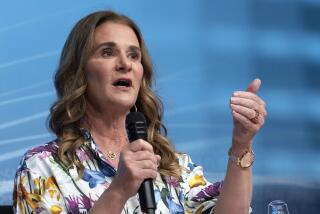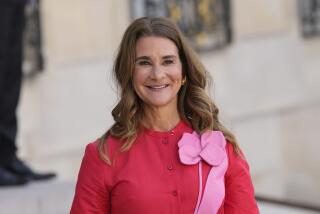An Emotional Gates Gives Foundation Scholarships
- Share via
SEATTLE — A day after a federal judge ordered the breakup of Bill Gates’ software empire, it was a college student who moved the Microsoft Corp. chairman to tears. Specifically, it was Filipina American Charlene Russell, whose voice failed her upon being named one of the Bill and Melinda Gates Foundation’s first minority scholarship recipients.
“The friends and the family and the teachers who pushed me . . . they believed that something was great inside me. And now I do believe it,” Russell, a business student at Clark College in Vancouver, Wash., said as she fought back tears.
Gates spoke next and, in a departure from the equanimity he has displayed throughout his antitrust battle, found himself wiping his eyes and fighting a catch in his voice.
“It may not be the most visible thing I’ll do this week, but it’s the most exciting thing of all,” Gates said about handing out the first of this year’s 4,100 scholarships.
A total of 20,000 Millennium Scholars grants will be awarded to low-income minority students over the next two decades. With a $1-billion endowment, it is the largest privately funded scholarship program in U.S. history.
The aim of the scholarships--which pay for all college expenses beyond basic tuition--is to boost minority employment in technical fields. High-achieving undergraduate students in all fields of study--and graduate students in math, science, engineering, education and library science--are eligible for scholarships through the doctorate level.
Of 27,000 doctorates awarded last year, explained Bill Gates’ wife, Melinda Gates, only 4% went to African Americans, 4% to Latinos, 5% to Asian Americans and fewer than 150 to Native Americans.
This year’s scholarship recipients include a young African American college freshman from Indiana who runs his own interdenominational missionary support program; a 23-year-old doctoral candidate in biostatistics at Virginia Commonwealth University, the daughter of a single black mother whose hearing impairment has left her unemployed; and a Nez Perce woman, studying pharmacy at Idaho State University, who is the only person in her family to attend college.
The winners were selected from among more than 62,000 nominations that flooded in from across the country over the last six months, Melinda Gates said.
“They’re bright, they’re caring, they already know what their role in society is, and they’re already looking toward being future leaders,” the foundation’s co-founder explained. “I was sort of stunned by the odds and obstacles that these young people have already encountered and come through in their lives.”
Bill Gates said that, despite an era of prosperity in America, “you can see some pretty stark divides. The opportunities are not as equal as they should be.
“Our vision here is these scholars should be able to achieve their full potential. They should not have the financial burdens dragging them back in any way,” he said.
The minority scholarship program--the largest grant made so far by the $21.8-billion foundation--has special resonance in Washington state, which like California has passed an initiative banning minority preferences in college admissions. The University of Washington has seen a 32% drop in minority enrollment over the last year.
Conservative commentators have criticized the decision to limit the scholarships to low-income minority students, something they say is an improper exercise of discrimination on the part of a tax-exempt foundation.
“You can argue it’s Bill Gates’ money and he has the right to do with it whatever he likes. And you can argue that the federal government should not grant tax-exempt status to bigots. But what you can’t argue is that the federal government should grant tax-exempt status to folks who discriminate against some racial groups and not others,” said Roger Clegg of the Center for Equal Opportunity, a conservative think tank based in Washington, D.C.
More to Read
Sign up for Essential California
The most important California stories and recommendations in your inbox every morning.
You may occasionally receive promotional content from the Los Angeles Times.













